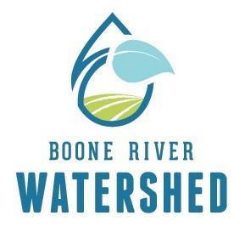Post submitted by Jordan Kolarik, Wright Soil and Water Conservation District Project Coordinator
 The Boone River Watershed Nutrient Management Initiative project has been granted additional funding from Iowa Department of Agriculture and Land Stewardship (IDALS). This is in order to extend the project for another three years to increase the use of conservation and water quality practices in Prairie and Eagle Creek Watersheds. In these projects, we will continue working towards meeting Iowa’s Nutrient Reduction Strategy goals. The extension process involved writing a new grant application based on the lessons learned from our first three years.
The Boone River Watershed Nutrient Management Initiative project has been granted additional funding from Iowa Department of Agriculture and Land Stewardship (IDALS). This is in order to extend the project for another three years to increase the use of conservation and water quality practices in Prairie and Eagle Creek Watersheds. In these projects, we will continue working towards meeting Iowa’s Nutrient Reduction Strategy goals. The extension process involved writing a new grant application based on the lessons learned from our first three years.
The project, led by the Wright Soil and Water Conservation District, started in 2014 with funding that was split between two sub watersheds within the Boone River Watershed. For the last three years the project employed two half time watershed coordinators, one that worked on the Eagle Creek Watershed and one who worked on the Prairie Creek Watershed. Project coordinators, among many things, are responsible for holding and attending outreach events, are responsible for project cost share applications and the conservation planning that goes with them, and grant administration for the project.
I started as a half time project coordinator in the Prairie Creek Watershed in the fall of 2015. At the end of last year, I became the full-time coordinator for both sub watersheds in this project. For the project extension application, I had creative control over adjustments to the projects focus, goals, and cost share options. I could utilize the lessons learned from the first three years of the project, my experiences and observations in the first year working with the project, and specific requests that I received from grant funders, partners and producers.
In the extension, we sought to increase collaboration and coordination with partners to implement innovative ways to reach new audiences and to improve technical assistance. We seek to transition to an increased focus on implementation of conservation practices that provide long term benefits (i.e. long term adoption of cover crops and edge-of-field practices).
As a result, I decided to change the cost share options in a way that I believe will encourage long term adoption of cover crops. This is by offering cost share at a higher rate for producers that sign up for three years compared to a one year sign up. Another request includes giving a higher cost share rate to those who are (1) first time users of cover crops, (2) going into a new crop, or (3) users of winter hardy species. We will also offer a higher rate to those who commit to doing both cover crops and strip-till/no-till.
IDALS requested a watershed plan to be completed by the end of the first year of our extension to identify the best locations not only for in-field practices, but also for edge-of-field practices. These include bioreactors, saturated buffers, filter strips, and wetlands. This will allow for a more focused approach to increase edge-of-field practices and help use resources in areas that will provide the greatest conservation benefits. The project will continue to provide cost share assistance for these practices, but will also work to leverage additional funding sources so that we may offer up to 100% cost share.
Education and outreach strategies will emphasize past successful efforts, such as hosting field days and meetings, social media presence, informational mailings, and recognition of local “Farmers Champions.” We are also adopting new ways to reach individuals not informed through these traditional approaches. To increase local partnership and locally led efforts, I came up with the idea to form two community-based groups as a way for local landowners and businesses to stay informed and get involved. The Friends of the Boone River group will help educate and keep the community updated on what is happening in the watershed. This group will also be an informational resource for those who would like to get involved through our mailing list. In addition, local businesses can become a Friend and, if interested, they will be added to a contact list for the project. The formation of The Boone River Watershed Conservation Farmer Advisory Group, led by local “Farmer Champions,” will provide insight to the project as well as education and outreach opportunities beyond the time and scope of the project.
One of the major objectives of this project is to increase the amount of long-term conservation practices on the land, and so permanent changes will be tracked through documenting the number of practices and the number of acres that they treat. It is our goal to have 50 farmers implement long term conservation practices and see a total of 6,000 acres of conservation practices. Lastly, we hope to see measureable improvement in the water quality of Eagle and Prairie Creek, which will be measured through voluntary tile water monitoring, edge of field practice water monitoring, and in-stream watershed scale monitoring. This will allow the project to assess the impacts agriculture management and water quality improvement practices are having on water quality.
The key changes to this watershed project extension have the theme of long-term adoption and increase participation. Everyone has a role to play if we are going to meet the nutrient reduction goals, regardless of where you live or where you work.
If you would like to learn more about the project, contact Jordan Kolarik at jordan.kolarik@ia.nacdnet.net.